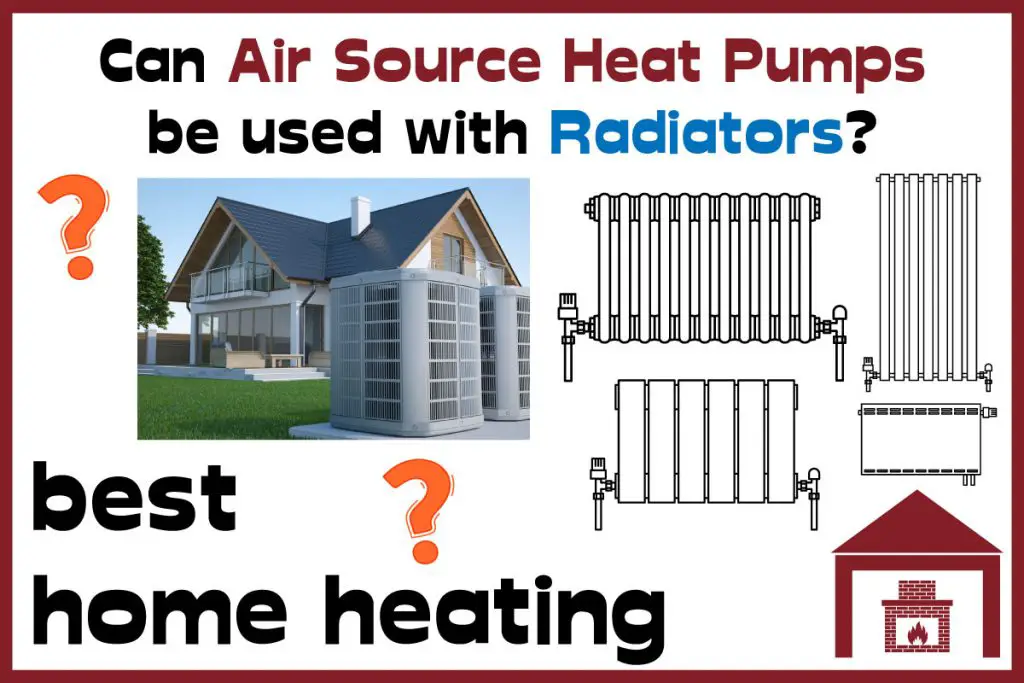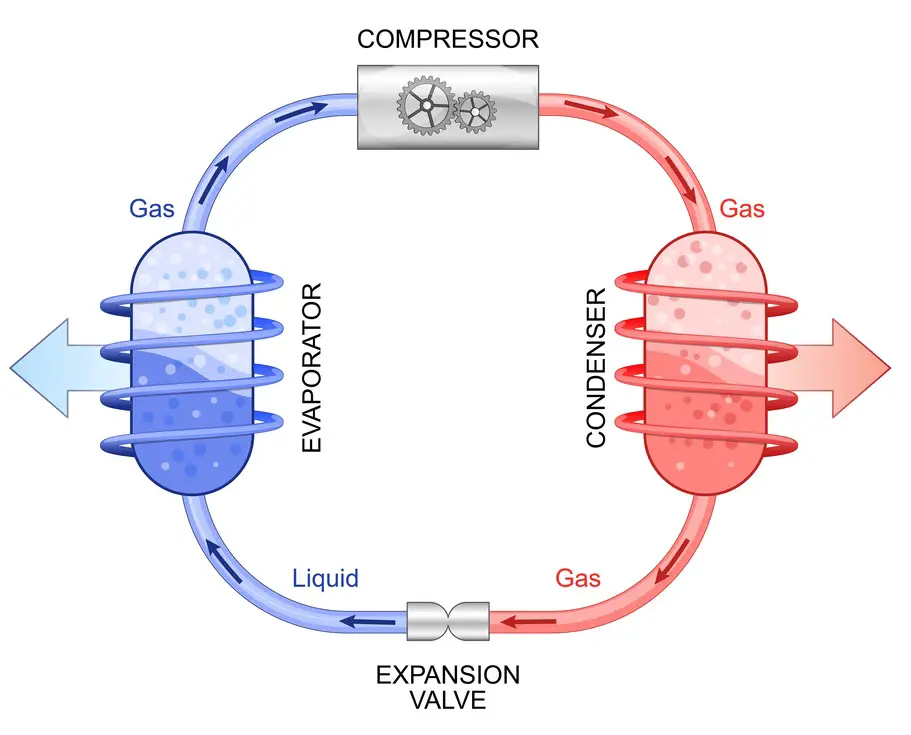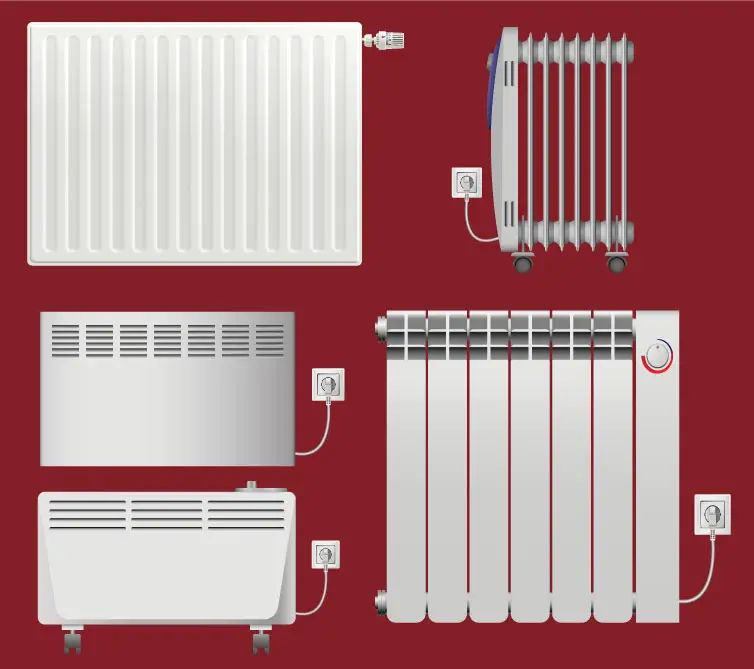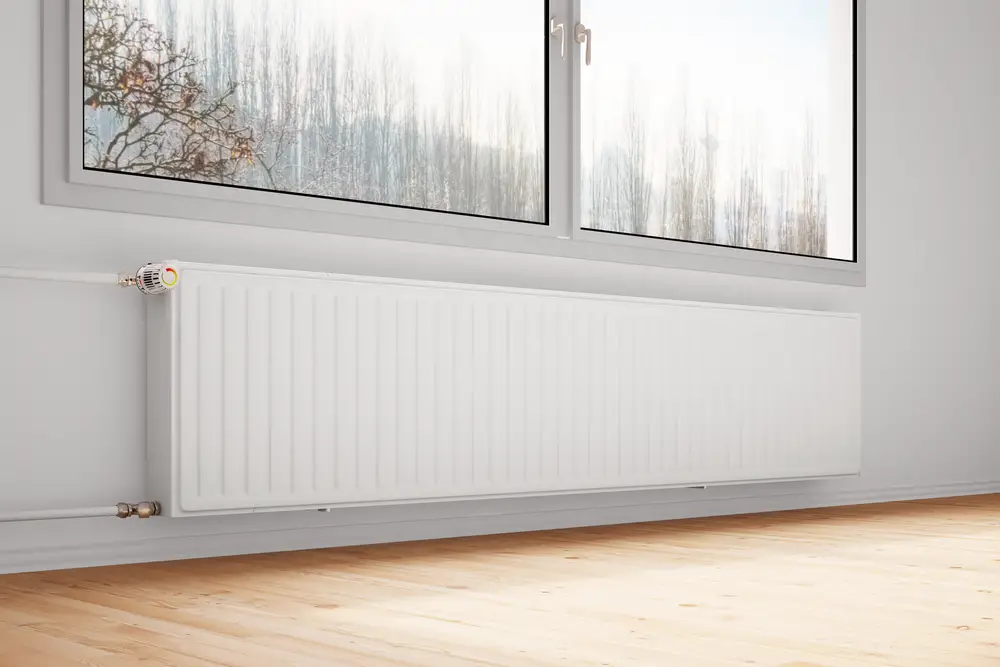Air source heat pumps use the outside air as a heat source and provide heating for residential and commercial buildings. People who are interested in air source heat pumps often wonder if they can be used with radiators. In this post, we are going to discuss everything you need to know about using these units with radiators.
Air source heat pumps can be used with radiators. The radiators must be properly sized because heat flow depends on the surface area of the radiators. Your existing radiator may be too small for an air source heat pump and therefore may need to be replaced with a larger one.
While radiators work with air source heat pumps, this combination may not be satisfactorily efficient. Underfloor heating is a better alternative because it turns the entire floor into a heat emitter. This makes use of the large surface area of the floor as the heat output mechanism.

Do you use Radiators with Air Source Heat Pumps?
Radiators can be used with air source heat pumps, though there are some key considerations to learn when combining these systems. To better understand this combination, let’s see how an air source heat pump works.
A typical air source heat pump has an outdoor unit containing a compressor and condenser that work in conjunction with your indoor air handling unit. The heat pump works in the same way as conventional refrigerators—just in reverse.
An evaporator, which contains liquid refrigerant, collects heat from the ambient air. As the heat travels from the air to the refrigerant, the liquid refrigerant turns into gaseous.
An electrically driven compressor then compresses the gas, raising its temperature. The hot gas travels via a condenser, which transfers the heat to the water in the radiators or underfloor heating system. The refrigerant turns liquid again and returns to the evaporator through an expansion valve. The process continues.
An air source heat pump is a low flow system and works well with a radiator that has a large surface area. Underfloor heating is a good option because it has a large surface area, and can be smoothly integrated. A combination of radiators and underfloor heating can be highly efficient.

Which radiators are best for air source heat pumps?
There are several different types of radiators, and they have their advantages and disadvantages. Before we explain how to pick the best ones for your home, let’s take a look at the options.
- Cast iron radiators: They are popular for their great conductivity and elegant designs. They look great in Regency, Edwardian, and Victorian-type houses with large spaces. However, these radiators are pretty expensive.
- Stainless steel radiators: This has an edge over other types in terms of craftsmanship. These heat emitters are durable, customizable, and easy to maintain. They are also known for their ability to withstand extreme temperatures. With that said, just like iron cast radiators, these radiators are expensive.
- Fan Convectors: These provide instantaneous heat in a compact format. A fan convector can be easily installed, and the system distributes heat evenly. These radiators use electricity to run. Some users do not like the movement of the fan.
- Standard steel panel radiators: These have relatively small surface areas, and do not work very well with air source heat pumps and other low-temperature systems.
- Aluminum radiators: Aluminum radiators are relatively inexpensive and available in many different sizes and types. They are very easy to clean and maintain. They work pretty well with heat pumps in part because of their great conductivity. Large ones are easily available on the market.

As we have stated, a better alternative to radiators is underfloor heating, which has a wide surface area. The only limitation of an underfloor heating system is that it takes about a couple of hours or even more to reach optimum temperature. A 10KW wet underfloor heating system contains around 30 liters of water, and an air source heat pump cannot quickly heat this water.
How hot do radiators get with air source heat pumps?
With an air source heat pump, radiators reach around 35°C to 45°C. This flow temperature is significantly lower than that of a boiler, with which radiators operate at around 70°C to 80°C.
Houses that were built before the 1970s do not usually have high levels of insulation. If your house is poorly insulated, you will have to make up for the heat loss by installing a larger heat pump. Due to the low flow temperature, an air source heat pump has an additional requirement: the house should be airtight and have a high level of insulation.
Would you need to buy new radiators when fitting an air source heat pump?
If you are replacing a gas boiler with an air source heat pump, your existing radiators may not even need replacing. How can you tell if your radiators will work smoothly with an air source heat pump? Well, a heat pump engineer can calculate the capacity and stability of your existing radiators.
Depending on your requirements, you may need to invest in heated towel rails or other additional heating devices. For most homes with air source heat pumps, underfloor heating is a better alternative to radiators. Underfloor heating materials and installation will cost anywhere between £500 and £8,000.
If you already have large radiators installed, you can use them without having to deal with any issues. The bottom line is, the heat emitter used with an air source heat pump should have a large surface area.

Can you combine central heating systems with air source heat pumps?
Yes. You can set up an integrated heating system, also known as a hybrid heating system, by combining your central heating system with an air source or ground source heat pump. This integration leads to significantly greater efficiency, and the installation process is not very complicated. It also takes up a fairly small space.
If you have a traditional boiler, you can install an air source heat pump to meet more demands for heat in the winter and to reduce your carbon footprint. An air source heat pump can provide sufficient heat for most parts of the year. In the depths of winter, when temperatures drop dramatically, your oil or gas boiler can be used in combination with the heat pump.
The high-efficiency oil or gas boiler can be fitted as a stand-alone unit. To accommodate the heat pump, you can install additional radiators afterward.
A hybrid system is not ideal for homeowners who are interested in using completely renewable energy sources. The upfront cost is relatively high. If you are thinking of going green, consider getting an air source heat pump that’s powerful enough to provide sufficient heating during the winter months.
Conclusion – Main Radiator Considerations when planning an Air source heat pump
When installing an air source heat pump, the size of the radiator should be the main consideration. In most situations, one is advised to use a larger radiator that is larger than the required size for heating. If you already have a large aluminum radiator, chances are that you will not have to replace it with a new one as they are the best type of radiators for air source heat pumps.
If not, consider investing in underfloor heating, oversized radiators(high running cost of electricity), or both. It all depends on your requirements. Make sure you are adequately informed before you invest in heating equipment. A reliable provider can help you make informed decisions.
Next, please check out my dedicated article assessing the costs and efficiency of air source heat pumps here.
